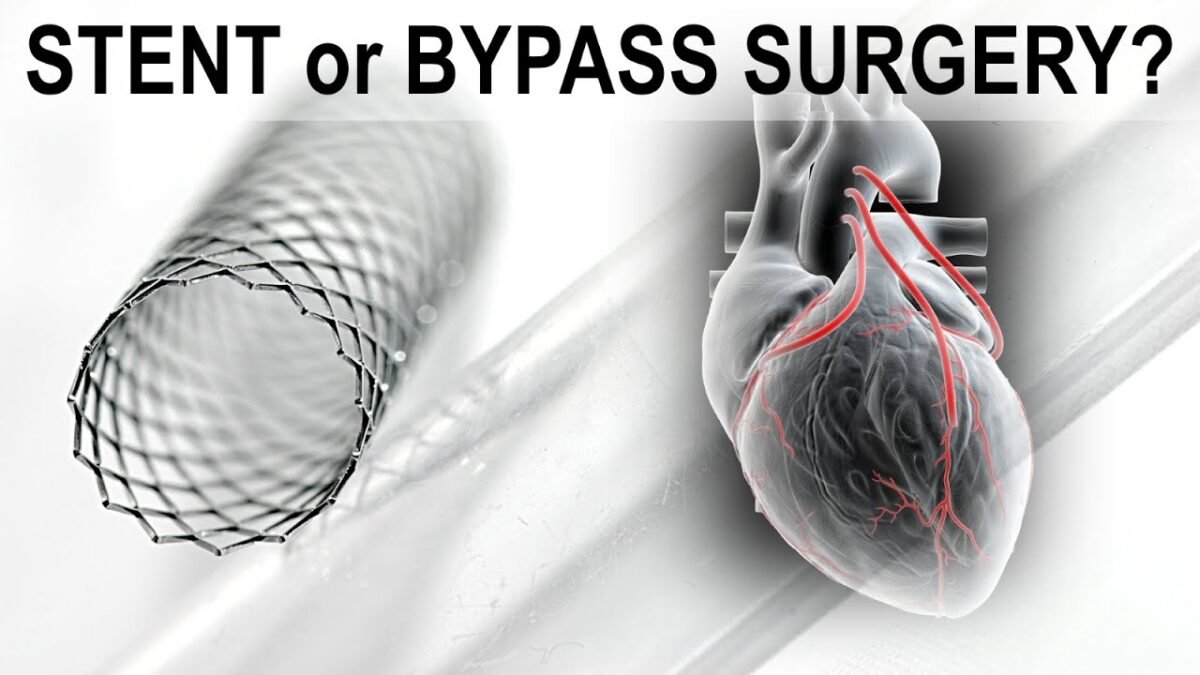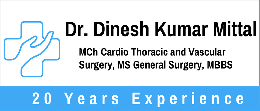Bypass Surgery or Stents? Making the Best Choice for Your Heart

Your heart beats about 1,00,000 times a day, pumping blood through a network of arteries that span more than 60,000 miles—enough to circle the Earth twice! But when these arteries become blocked, the risk of heart attacks and heart failure rises dramatically.
In this situation, the heart needs efficient treatment solutions that can restore normal cardiac blood flow and stop potentially fatal consequences like heart attacks and heart failure. For patients diagnosed with coronary artery disease (CAD)—a condition where the arteries supplying blood to the heart become narrowed or blocked due to plaque buildup—choosing the proper treatment is a critical decision.
Understanding the advantages and disadvantages of stents versus bypass surgery is crucial, as millions of patients worldwide struggle to make the optimal treatment decision. In this blog, we will explore which treatment is best based on the degree of blockages, the patient’s general health, any underlying medical issues, and the long-term efficacy of each treatment approach.
Understanding Stents and Bypass Surgery
An artery that has constricted or becomes clogged can be kept open by inserting a tiny mesh tube called a stent. Before inserting the stent, a small balloon is inflated to expand the artery in this technique, which is called angioplasty. Stents are frequently used to enhance blood flow with little recovery time when obstructions are not too severe.
Coronary artery bypass grafting (CABG), another name for bypass surgery, is a more intrusive technique in which a surgeon creates a new blood conduit from another area of the body to bypass the blocked artery. It is usually advised that patients with complicated arterial disease or multiple blockages have this surgery.
Dr. Dinesh Kumar Mittal, a leading Cardiothoracic and vascular surgeon, says, “Bypass surgery offers a more comprehensive solution for patients with multiple or complex artery blockages, significantly reducing the chances of recurrence and improving long-term outcomes.”
Best Treatment for Blocked Arteries: Stents or Bypass Surgery
Choosing between stents versus bypass surgery for heart disease is essential for heart health. The right choice depends on the patient’s condition, severity of blockages, and overall health.
Stents Are Safer for Low-Risk Patients:
Stents (angioplasty combined with stent insertion) offer a less invasive therapeutic alternative with fewer significant risks for people with mild to severe coronary artery disease. Because the stent is implanted by a tiny catheter into an artery rather than requiring extensive incisions or general anaesthesia, the technique is minimally invasive. The risk of side effects, including stroke, infections, or excessive bleeding, is significantly reduced in stenting as it eliminates the need for open heart surgery. The majority of patients recover considerably more quickly, returning to their regular activities within a week after being released from the hospital in a day or two.
Bypass Surgery Is Safer for High-Risk Patients:
Coronary artery bypass grafting (CABG) is the safer and more efficient approach for patients with severe or multiple blockages. People with complicated arterial disease benefit most from it, especially if they have blockages in several arteries or essential places. According to studies, individuals who undergo bypass surgery have an 88% 5-year survival rate, whereas those who receive stents have an 81% 5-year survival rate. According to another study from the American College of Cardiology, bypass surgery reduces the risk of severe heart problems in patients with diabetes and multi-vessel disease by 44% compared to stent placement.
“While stents are effective for mild cases, patients with severe coronary artery disease should strongly consider bypass surgery, as it offers better long-term outcomes and reduces the likelihood of repeat procedures,” says Dr. Dinesh Kumar Mittal.
One of the patients of Dr. Dinesh shared, “I had a 90% blockage in one of my arteries and was advised to go for stenting, but after consulting Dr. Mittal, he recommended a more thorough evaluation, which revealed multiple blockages. I underwent bypass surgery, and today, I feel a new sense of energy and vitality. I am forever grateful to Dr. Mittal for his accurate diagnosis and exceptional care.”
“Before meeting Dr. Mittal, I was constantly fatigued and had frequent shortness of breath. My angiogram revealed severe artery blockages. Dr. Mittal explained my options thoroughly, and I chose bypass surgery. The recovery was smoother than I expected, and now, months later, I feel rejuvenated. I can finally enjoy my daily walks again!” says another patient of Dr. Dinesh Mittal.
Can Stents Fix All Heart Blockages?
While stents are an excellent solution for mild to moderate blockages, they may not be effective in more complex cases. Several factors determine whether a stent can successfully restore blood flow or if a different treatment, such as bypass surgery, is needed.
Complete Blockages (Chronic Total Occlusions – CTOs):
Stents may not work for long-term complete blockages.
Diffuse Artery Disease:
When blockages extend over a long segment, multiple stents may not be a stable solution.
Heavily Calcified Arteries:
Severe calcium buildup makes arteries rigid and difficult to expand with stents.
Imaging tests like angiograms are used to assess the severity, location, and nature of the blockages. Based on the reports, whether a stent, medication, or bypass surgery is decided.
Can Heart Blockages Come Back After Stents?
Can heart blockages come back after stents? This is one of the biggest worries for people getting stents. Yes, since there is a chance of restenosis or re-blockage, which happens when the treated artery narrows once more.
The type of stent used and lifestyle factors, including smoking, poor dietary habits, and lack of exercise, all affect the risk of restenosis. Certain medical disorders, such as diabetes and hypertension, also increase the risk.
However, Bypass surgery provides a more durable solution by completely bypassing the blocked section of the artery.
What to Expect After Stent Placement?
Stent surgery restores blood flow quickly, but what happens next? Here’s a quick look at recovery, from hospital stay to long-term care:
Hospital Stay & Immediate Care:
Most people stay in the hospital for a day or two after getting a stent. Patients are monitored for any issues like bleeding or clotting. Some soreness might be felt where the catheter was inserted, but medication helps with that.
Recovery at Home:
Patients are allowed to do light activities within a few days and get back to work within a week. No heavy lifting or intense exercise should be practised. Also, keeping up with medications (especially blood thinners) is super important to prevent complications.
Long-Term Outlook:
Stents work great for improving blood flow, and most people feel immediate relief from chest pain. But in some cases (10–20%), the artery can narrow again over time, especially if lifestyle changes aren’t made.
While stents offer a quick fix with minimal downtime, people with more severe heart disease may eventually need further treatment, including another stent or even bypass surgery.
What to Expect After Heart Bypass Surgery?
Patients considering bypass surgery often wonder what to expect after heart bypass surgery. Recovery typically includes:
Hospital Stay & Immediate Post-Surgery Care:
Most patients stay in the hospital for 5–7 days, closely monitored for complications like infection, bleeding, or arrhythmias. Pain medication is provided to manage discomfort and aid recovery.
Initial Recovery at Home:
Light activities can typically begin within 2–4 weeks, with most patients resuming regular routines in 4–6 weeks. Proper incision care is crucial to prevent infection, and mood fluctuations or fatigue are common but temporary.
Long-Term Outcomes & Success Rates:
80–85% of patients experience significant symptom relief, and studies show that 90% of bypass grafts remain open after 10 years, making them a more effective solution than stents.
While bypass surgery has a longer recovery time than stents, it provides better long-term outcomes for many patients with severe artery disease.
Final Thoughts: Choosing the Right Treatment
Deciding between stents vs bypass for heart disease requires careful consideration of the severity of blockages, overall health, and long-term benefits. While stents offer a less invasive option with faster recovery, bypass surgery is often the best treatment for blocked arteries in patients with multiple or severe blockages. Ultimately, the best decision should be made by considering various factors such as the patient’s condition, severity of blockages, and overall health.
Whether you choose stents or bypass surgery, proactive heart care and lifestyle changes are essential for long-term heart health.
FAQs
1. Should I get a stent or bypass surgery?
If your blockage is small, a stent can quickly fix it. If it’s more serious, bypass surgery is the better long-term fix. Your doctor will help you decide.
2. How long will I be out of action?
With a stent, you’re usually back to normal in a week. Bypass surgery takes a month or more to recover fully, but it lasts longer.
3. Can I exercise after getting a stent or bypass surgery?
Yes! But you need to take it slow. Light activities can start within days after a stent and within a few weeks after bypass surgery. Always follow your doctor’s advice on when to increase activity.
4. Is bypass surgery dangerous?
It’s a major surgery, so there are risks, but for people with severe blockages, it’s often the best shot at a healthier life.
5. Will I need to take medication after the procedure?
Yes, most patients need blood thinners and other heart medications to prevent complications and keep their arteries open.
Explore more blogs: When is Stent Placement Better Than Open Surgery?
